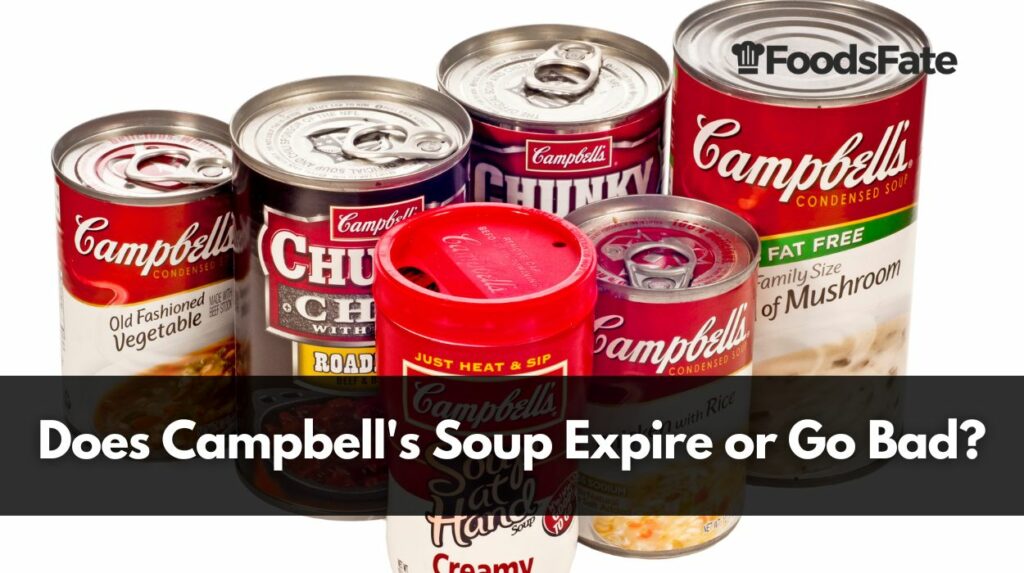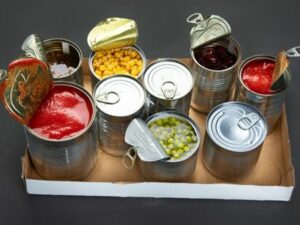
Campbell’s soup has found its way into every pantry and turned out to be one of the best comfort food, especially on those sick gloomy days. However, there are instances when we stock up on these cans and forget about them, only to remember to use them when the expiration date has passed.
So if you are also facing a dilemma and wondering if you can consume the soup or if you should discard it, we are here to help!
Consider reading this post before you decide to dump the can in the garbage. In this post, we’ll go over the warning signs you should watch out for before consuming canned soups and some additional advice that can help you extend the shelf life of your canned goods overall.
To make your time worthwhile, I have also personally experimented to determine the effect of time on canned Campbell’s soup.
Where is Campbell’s soup expiration date?
Cambell’s soup is a nutritious boost that has made its way into every pantry due to its ease of availability and unforgettable taste; however, before purchasing, people are confused and unable to understand where to locate the expiry date or the best-before date.
In Campell’s soup, the date is written on the back of the can. It indicates the date the manufacturer recommends using and consuming the food without compromising on the taste and texture. Ideally, Campbell’s soup can last almost two years if the can is undamaged.
Does canned food go bad?

Just like any other food item, canned food can also go bad. Several intrinsic and extrinsic factors are in play that can determine the shelf life of the canned food item. Let us look closely into some of these factors.
Since Campbell’s soup has high water content, keeping a close eye on them is crucial to prevent bacterial contamination and moisture-related complications like mold formation.
High Temperature
One of the most important factors influencing the life of canned food is the temperature at which it is stored. Even though it is not important to refrigerate them before they are open, one must store them in a clean and dry place that is away from direct heat. High temperatures can affect the shelf life of canned food items and deteriorate them.
Water
Since the cans are made up of metals, it is imperative to store them in an area away from water. The more water activity around the can, the higher chances that the can may get rusted and even undergo corrosion.
Furthermore, if the can has water around it, the chances of microbial activity increase around the vicinity, thus limiting the overall shelf life of the canned food item.
Packaging and Transport
Even though this is something that is not in your control, there is a possibility that Campbell’s soup containers can get damaged during transportation.
Hence, when you go to a store to purchase them, ensure that you select a container that is not leaking and is free from random dents and scratches.
What is the difference between bulging lids and concave lids?
Canned foods are processed and packed under high pressure. However, if the packaging is compromised, the first physical flaw that one may notice is the lid and overall structure of the can.
If the lid is concave, it indicates that the seal of the soup is not compromised and the content within the can is free from contamination and associated deterioration.
However, if the lid is bulging, it is a clear indication that the high-pressure seal is damaged; hence, the food inside may be degraded. Hence, it is best to avoid consuming soups that have bulging lids.
Can packaging make a difference in the shelf life of canned food?
Yes! The types of packaging used can greatly impact the overall longevity of any canned product.
For instance, if the can is dented or twisted, there are chances that there will be a puncture or fracture somewhere on the can. This puncture marks an entry for microbes and bacteria, resulting in a general degradation of the substance in the soup and, subsequently, the associated taste and flavor.
Why does the can make a hissing sound when you open it?
When Campbell soup is packaged, it is vacuum sealed under high pressure. The space between the soup and the lid of the can is called the headspace.
Since these soup cans are packaged under the influence of high temperatures and pressure, they are sealed along with a compound that makes them air-tight.
As soon as you open the can, there is a sudden temperature change. Hence, the compound interacts with the surrounding air, and you can hear the hissing sound as soon as the air enters the can.
The hissing sound is simply a sound this compound makes as the gas inside the can is replaced by the gas in the atmosphere when the can is opened. Hence, you are not alarmed when you hear an occasional sound when you open canned food items.
However, if you notice that the structure of the can is disrupted or lob-sided, avoid drinking such a soup.
A mini-experiment that I performed

I experimented by letting my canned soup sit for one year after its best-before date and comparing it to the soup I had recently purchased, with one year left to fulfill its expiration date.
The goal was to understand if there was a significant change in the two soup cans’ overall taste, texture, and aroma. To my amazement, both soups tasted the same.
The textures of the two different soups did not seem to differ significantly, even though it was a year past its sell-by date. Since I want to be completely truthful about everything, I must mention that I detected a few more gas bubbles in the soup past its expiry date.
The aroma of both soups was absolutely the same. The soup was not mushy and tasted as authentic as a regular Campbell soup.
Hence, it is safe to conclude that the best-before date is not a date sealed in iron. It is merely a suggestion, and you can consume canned Campbell Soup for at least a year or two after the printed best before.
However, be mindful that if you notice any abnormalities concerning the color and texture, avoid consuming them. Furthermore, if you notice that the can is damaged, dented, or leaking from any corner, discard it irrespective of the best-before date.
Can you refrigerate canned food?
Ideally, there is no strict rule to refrigerate canned food unless the packaging demands that. Campbell’s soups can last for years on the shelf if the packaging is intact. However, storing it at low temperatures is imperative to avoid contamination by proliferating microbes once you open the seal.
Once the can is opened, you can extend the shelf life by storing it in the fridge for 2 to 3 days.
However, while storing these canned soups in the refrigerator, transfer the content to another plastic or glass container. Since cans are made up of metal, there are chances that the metal may leach into the soup and result in complicated health concerns. No one likes metallic soup, right?
Ensuring that the contents of an open soup are kept in an air-tight container is another precaution to be taken. By doing this, you can be sure that none of the other flavors and odors will contaminate the soup.
If an opened sou is not sealed properly, it makes the content susceptible to an endless variety of infections and increasing germs; hence, if you forget to seal the soup, it is best to discard it.
Test to Determine if the food is eatable

You can perform a few simple tests if you are confused and apprehensive before consuming your Campbell soup that is past its best-before date. As mentioned earlier, the expiry date is not an indication of food spoilage; it is just a safe date indicating that they cannot be kept on the shelf after that.
Visual Test
One of the best ways to determine if the can is safe and can be consumed is by closely analyzing it. It would be free from physical damage if it could be kept safely.
It is preferable to toss away a can if you discover any sporadic dents or fractures on it. Consuming goods with tampered packaging can result in bacterial infections of wide varieties.
If the can is in good condition, open it and examine the surface colors and textures. It is certainly spoiled if the soup appears discolored or has green particles inside the soup.
Taste Test
Another amazing way to determine if canned soup is safe for consumption is simply tasting it. You can tell whether the flavor of the Campbell soup is slightly changed if you are familiar with how it typically tastes.
Furthermore, if there is bacterial growth, you will notice that the texture is different. If you notice the slimy and moldy consistency, you can discard it.
Sniff Test
If your eyes cannot detect a flaw, the sense of smell will help you! If you notice a foul smell, it is a big giveaway that the soup is way past its consumption timeline.
How can you extend the shelf life of Campbells Soup
Here are some tips and tricks that can come in handy when you plan to store your soup for some years.
Tip 1: Ensure that the can is stored in a safe place. A safe place is a place that is free from extreme temperatures, dust, mites, water, etc.
Tip 2: If you notice that the jar has accumulated dust due to storage, wipe it clean with a paper towel.
Tip 3: Occasionally wash the jar and wipe it dry to avoid pest accumulation.
Tip 4: Avoid storing it in uninsulated areas or under the influence of direct sunlight.
Tip 5: Avoid storing the canned soup in refrigerators and freezers unless it is open. If they are put in the refrigerator, there are chances that the compound and vacuum-sealed pressure will expand. The expansion will result in bloating or denting the canner soup, hence, reducing the overall shelf life of the soup.
FAQs
In this section, we will discuss some commonly asked questions.
Can you get sick from eating expired canned soup?
Answer: Ideally, no. If the overall packaging is undisturbed and not tampered with, you will not notice any significant difference in the taste and aroma. Mostly canned soups can be consumed for at least two years after expiration.
Does Campbell’s soup contain MSG?
Answer: The good news is that Campbell products do not have additional MSG. Since the company has repeatedly asserted that this product is devoid of MSG, customers prefer it because most people are still suspicious of this specific ingredient.
Are canned soups an unhealthy addition to your diet?
Answer: Although many believe that consuming canned food can be dangerous, it ultimately depends on the constituents of the nutrients you consume. As per the official website, Campbell soups have reduced their overall sodium quantity and are free from harmful chemicals like MSG; hence, they are safe for consumption.
Takeaway
Campbells Soup can last for about two years past its best-before date. Hence, you can safely consume it if it passes all the tests mentioned above.
If you plan to store the soup for months, try to store it in a place away from direct sunlight and moisture.
Furthermore, if the area where you plan to store it is infested with bugs and pests, there are chances that the soup is contaminated.
The soup can be kept refrigerated for about three days after it has been opened. Special care must be taken to ensure they are adequately sealed to prevent metallic lesions and contaminations.
I hope you found this article helpful. Let me know in the comment below if you have any further queries.



